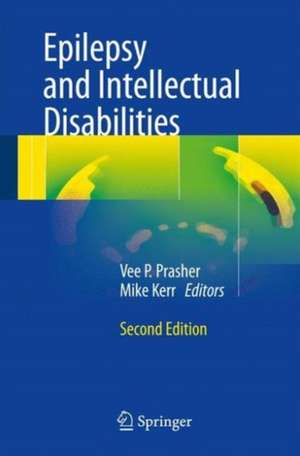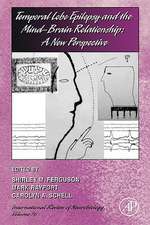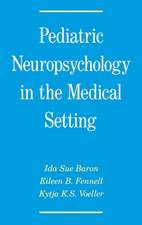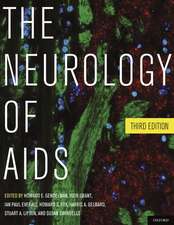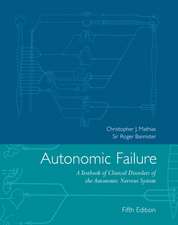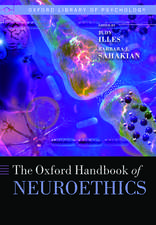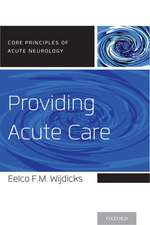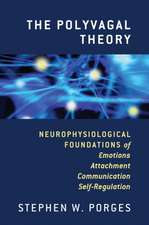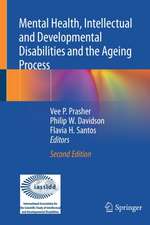Epilepsy and Intellectual Disabilities
Editat de Vee P. Prasher, Mike Kerren Limba Engleză Paperback – 2 noi 2016
Ongoing developments in the general population, which will more likely than not become relevant to the intellectually disabled population, are discussed. The impact of epilepsy on the person themselves and their carers is acknowledged, and person-centred treatment programs with a multifaceted team approach are proposed.
This book is aimed at physicians and residents in neurology and pediatrics, as well as other practitioners working with this population, such as neuropsychologists. Epilepsy and Intellectual Disabilities, Second Edition is recommended reading for all those caring for this important group of individuals.
Preț: 729.74 lei
Preț vechi: 768.15 lei
-5% Nou
Puncte Express: 1095
Preț estimativ în valută:
139.63€ • 146.31$ • 115.43£
139.63€ • 146.31$ • 115.43£
Carte tipărită la comandă
Livrare economică 07-14 aprilie
Preluare comenzi: 021 569.72.76
Specificații
ISBN-13: 9783319391427
ISBN-10: 3319391429
Pagini: 190
Ilustrații: XIV, 339 p. 22 illus., 7 illus. in color.
Dimensiuni: 155 x 235 x 19 mm
Greutate: 0.68 kg
Ediția:2nd ed. 2016
Editura: Springer International Publishing
Colecția Springer
Locul publicării:Cham, Switzerland
ISBN-10: 3319391429
Pagini: 190
Ilustrații: XIV, 339 p. 22 illus., 7 illus. in color.
Dimensiuni: 155 x 235 x 19 mm
Greutate: 0.68 kg
Ediția:2nd ed. 2016
Editura: Springer International Publishing
Colecția Springer
Locul publicării:Cham, Switzerland
Cuprins
Section I: Clinical Issues.- Introduction.- Epilepsy: A General Overview.- Epidemiology of Epilepsy in Persons with Intellectual Disabilities.- Diagnosis of Epilepsy in Persons with Intellectual Disabilities.- The Differential Diagnosis of Epilepsy.- Section II: Treatment Issues.- Management of Acute Seizures in Persons with Intellectual Disabilities.- The Use of Antiepileptic Medication in Adults with Intellectual Disabilities: A Serious Conundrum.- Vagus Nerve Stimulation Therapy: An Intellectual Disabilities Perspective.- Resective Surgery for Patients with Epilepsy and Intellectual Disabilities.- Non-pharmacological Management of Epilepsy in Adults with Intellectual Disabilities.- Section III: Psychosocial Issues.- Psychopathology in People with Epilepsy and Intellectual Disabilities.- Associated Physical Problems of Epilepsy in Intellectual Disabilities.- Epilepsy and Cognition.- Nursing and Community Aspects of Epilepsy in Intellectual Disabilities.- Impact of Epilepsy and Intellectual Disabilities on Family Life.- Epilogue—Death and Love in Epilepsy.
Recenzii
Selected as "Highly Commended" in Neurology at BMA Medical Book Awards for 2017.
“This is an excellent summary of the field which covers the whole area of epilepsy and learning disability very well. It is well-written and clear and uses the literature appropriately.“ (BMA Medical Book Awards, September, 2017)
Notă biografică
Vee Prasher is a NHS Consultant in Intellectual Disabilities and visiting Professor of Neuropsychiatry. He qualified in 1985 from the University of Birmingham UK as a Medical Doctor. He initially did neurosurgery training, later general psychiatry, and finally specialised in the field of intellectual disability. He has been actively involved in research in intellectual disability, having published over 100 articles relating to people with intellectual disability. He has completed 3 post doctorate degrees in this field, MMedSc, MD, and PhD. As an editor or author he has published 10 textbooks. He has a recognised international reputation and has been involved in a number of international studies and reports highlighting health issues for persons with intellectual disability.
Professor Mike Kerr studied medicine in Bristol (UK), General Practice in York and Psychiatry in Cardiff. He came to Wales in 1990. His clinical practice is in the epilepsies associated with learning disability and in the assessment and treatment of epilepsy and psychiatric disorder. He has been closely associated with initiatives in improving the public health of people with an intellectual disability including developing the Cardiff Health Check, which is used across England and Wales.
Academically he has published widely on healthcare, epilepsy and intellectual disability and held research grants from many funding bodies. He is chair of the Advisory Board for Wales of Epilepsy Action, a trustee of Epilepsy Research UK and SUDEP ACTION. He is a medical advisor for the Rett Society, The Down Syndrome Association and SUDEP ACTION. He is a member of the International League Against Epilepsy (ILAE) commission on neuropsychiatric aspects of epilepsy and an editor of the Cochrane collaboration epilepsy group. He has been appointed as a clinical Champion for Wales. He has also been appointed as an Ambassador for Epilepsy by the ILAE and International Bureau for Epilepsy.
Professor Mike Kerr studied medicine in Bristol (UK), General Practice in York and Psychiatry in Cardiff. He came to Wales in 1990. His clinical practice is in the epilepsies associated with learning disability and in the assessment and treatment of epilepsy and psychiatric disorder. He has been closely associated with initiatives in improving the public health of people with an intellectual disability including developing the Cardiff Health Check, which is used across England and Wales.
Academically he has published widely on healthcare, epilepsy and intellectual disability and held research grants from many funding bodies. He is chair of the Advisory Board for Wales of Epilepsy Action, a trustee of Epilepsy Research UK and SUDEP ACTION. He is a medical advisor for the Rett Society, The Down Syndrome Association and SUDEP ACTION. He is a member of the International League Against Epilepsy (ILAE) commission on neuropsychiatric aspects of epilepsy and an editor of the Cochrane collaboration epilepsy group. He has been appointed as a clinical Champion for Wales. He has also been appointed as an Ambassador for Epilepsy by the ILAE and International Bureau for Epilepsy.
Textul de pe ultima copertă
This second edition of a successful book provides updated clinical and research knowledge, including information on the licensing of new antiepileptic drugs. All chapters are updated to reflect present accepted practice and new chapters highlighting the importance of the genetic aspects of epilepsy, nonpharmacological treatments, and the impact of epilepsy on families and carers have been added.
Ongoing developments in the general population, which will more likely than not become relevant to the intellectually disabled population, are discussed. The impact of epilepsy on the person themselves and their carers is acknowledged, and person-centred treatment programs with a multifaceted team approach are proposed.
This book is aimed at physicians and residents in neurology and pediatrics, as well as other practitioners working with this population, such as neuropsychologists. Epilepsy and Intellectual Disabilities, Second Edition is recommended reading for all those caring for this important group of individuals.
Ongoing developments in the general population, which will more likely than not become relevant to the intellectually disabled population, are discussed. The impact of epilepsy on the person themselves and their carers is acknowledged, and person-centred treatment programs with a multifaceted team approach are proposed.
This book is aimed at physicians and residents in neurology and pediatrics, as well as other practitioners working with this population, such as neuropsychologists. Epilepsy and Intellectual Disabilities, Second Edition is recommended reading for all those caring for this important group of individuals.
Caracteristici
Promotes better clinical management of epilepsy in persons with intellectual disabilities Provides an understanding of medical, psychological and social sequelae of epilepsy Includes relevant updates from the last ten years Written and edited by international, multidisciplinary experts working in this field
